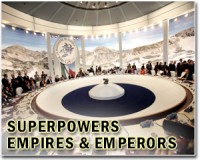| . |  |
. |
Beijing (AFP) March 2, 2010 A senior US diplomat arrived in China Tuesday for talks aimed at putting Sino-US relations back on track, with tensions high over US arms sales to Taiwan and a White House visit by the Dalai Lama. US Deputy Secretary of State James Steinberg will also focus on efforts to bring North Korea back to stalled nuclear disarmament negotiations, and try to persuade Beijing to back new sanctions against Iran over its atomic drive. State Department spokesman Philip Crowley said Beijing and Washington needed to put aside their differences -- over everything from Taiwan and Tibet to Internet freedom and the value of the yuan -- to move forward. "We've gone through a bit of a bumpy path here and I think there's an interest, both within the United States and China, to get back to business as usual as quickly as possible," Crowley told reporters on Monday. Crowley said the visit offered an opportunity to "refocus on the future" of relations between the United States and China, the world's largest and third-largest economies. But Steinberg faced a tough task, as Chinese foreign ministry spokesman Qin Gang on Tuesday reiterated Beijing's longstanding position that Washington was to blame for the array of problems in the trans-Pacific partnership. "The responsibility for the current difficulty in China-US relations goes completely to the US side," Qin told reporters. "We hope the US side takes the Chinese position seriously." Steinberg, who is accompanied by Jeffrey Bader, US President Barack Obama's top Asia adviser on the National Security Council, will head to Tokyo on Thursday for talks with Japanese officials before heading home. The US embassy in Beijing confirmed their arrival in China Tuesday, without providing further details on their schedule. When he took office in January 2009, Obama promised to broaden the Sino-US relationship and in July he said their ties would "shape the 21st century". The US president made his maiden official visit to China with much fanfare in November. But since then ties have faltered, with Beijing angry over the January approval of a 6.4-billion-dollar arms package to Taiwan and Obama's meeting last month at the White House with the Dalai Lama. China considers Taiwan, which split from the mainland at the end of a civil war in 1949, part of its territory awaiting reunification. China vilifies the Dalai Lama, Tibet's exiled spiritual leader who fled his homeland in 1959, as a separatist. Sino-US ties have also been affected by Internet giant Google's threats to pull out of the emerging Asian market over cyberattacks and government web censorship, and a variety of trade and currency issues. "We have a very broad, deep, complex relationship with China. There are many areas where we have achieved a consensus view. North Korea would be a great example of that," Crowley said. "There are some areas where we do not yet have a convergent view. Iran might be an example of that," he added, noting that both subjects were on Steinberg's agenda in Beijing. The six-party talks on ending North Korea's nuclear weapons drive, hosted by China, have faltered since Pyongyang stormed out in April last year, a month before staging a second nuclear test. Pyongyang says it cannot return until UN sanctions are lifted and it receives a US commitment to discuss a formal peace pact, replacing the armistice which ended the 1950-1953 war on the Korean peninsula. US special envoy Stephen Bosworth -- who visited China, South Korea and Japan last week in a bid to kickstart the negotiations -- said Saturday he hoped the talks would resume "fairly soon". On Iran, the United States and China are divided, with Washington pushing for tough new sanctions against Tehran over its disputed nuclear programme, but Beijing insisting -- again on Tuesday -- that more talks are the answer. "We believe there is still room for diplomatic efforts," said Qin, the foreign ministry spokesman. Chinese Premier Wen Jiabao said Saturday that he hoped 2010 would not be "an unpeaceful year" for trade and economic relations with the United States.
Share This Article With Planet Earth
Related Links Learn about the Superpowers of the 21st Century at SpaceWar.com Learn about nuclear weapons doctrine and defense at SpaceWar.com
 US expects more top-level dialogue with China
US expects more top-level dialogue with ChinaWashington (AFP) March 2, 2010 The United States said Tuesday it expected more top-level dialogue with China in the coming months and voiced hope for cooperation in pressing Iran on its nuclear program. State Department spokesman Philip Crowley said that China has proposed to the United States a date for the next round of "Strategic and Economic Dialogue," which last year involved Secretary of State Hillary Clinton. " ... read more |
|
| The content herein, unless otherwise known to be public domain, are Copyright 1995-2010 - SpaceDaily. AFP and UPI Wire Stories are copyright Agence France-Presse and United Press International. ESA Portal Reports are copyright European Space Agency. All NASA sourced material is public domain. Additional copyrights may apply in whole or part to other bona fide parties. Advertising does not imply endorsement,agreement or approval of any opinions, statements or information provided by SpaceDaily on any Web page published or hosted by SpaceDaily. Privacy Statement |